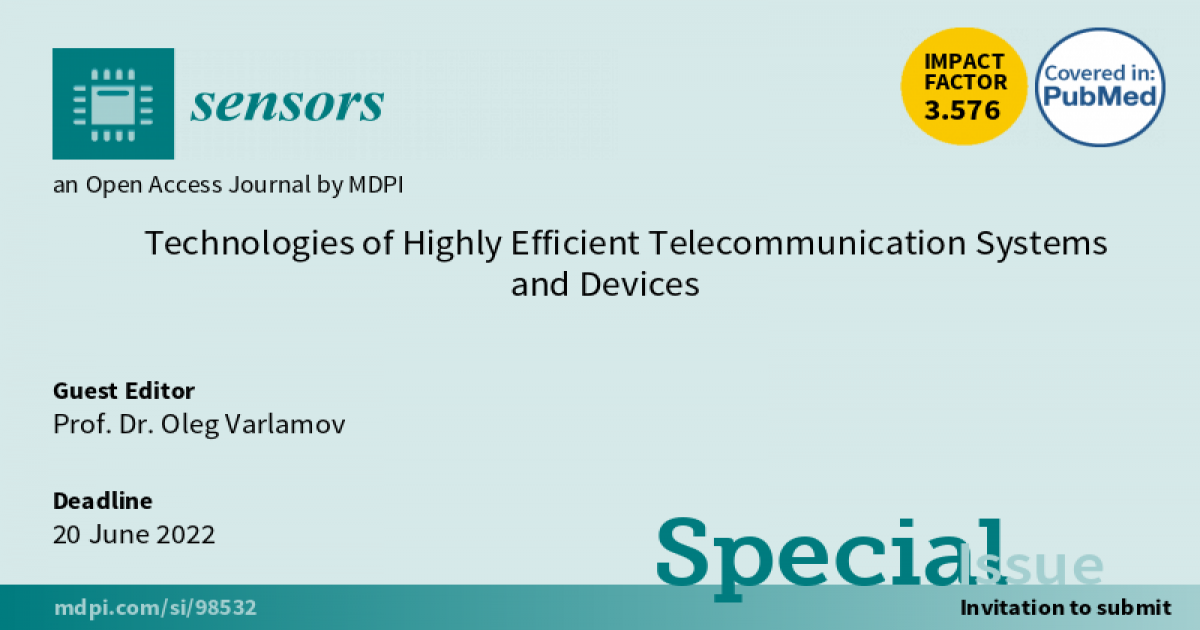Technologies of Highly Efficient Telecommunication Systems and Devices
A special issue of Sensors (ISSN 1424-8220). This special issue belongs to the section "Communications".
Deadline for manuscript submissions: closed (20 December 2023) | Viewed by 116207

Special Issue Editor
2. Department of Radio Equipment and Circuitry, Moscow Technical University of Communication and Informatics, 111024 Moscow, Russia
Interests: mobile and personal communications; digital broadcasting; performance analysis of communication systems; high efficiency RF power amplifiers
Special Issue Information
Dear Colleagues,
Telecommunications is progressively being implemented all around the world, connecting not only people with each other, but also many technical devices around us. At the same time, the resources that they can use are fundamentally limited—in both spectral and energy efficiency.
This Special Issue will look at advanced technologies for increasing the efficiency of telecommunication systems and devices globally speaking. This is an increase in spectral efficiency (the creation of new signal-code constructions, the use of MIMO technologies), and energy efficiency (the use of amplification methods with high efficiency), taking into account their possible coexistence.
A wide range of applications for these solutions is required in various levels of the development surrounding telecommunications infrastructure, characteristics of objects in terms of mass and speed, and differences in the conditions of radio wave propagation. These solutions will be energetically locally optimal for each specific condition, and that is the purpose of this Special Issue. We invite all the academic community, researchers, and leaders from the industry, and innovators to contribute with great new ideas for our common and global connected world.
Prof. Dr. Oleg Varlamov
Guest Editor
Manuscript Submission Information
Manuscripts should be submitted online at www.mdpi.com by registering and logging in to this website. Once you are registered, click here to go to the submission form. Manuscripts can be submitted until the deadline. All submissions that pass pre-check are peer-reviewed. Accepted papers will be published continuously in the journal (as soon as accepted) and will be listed together on the special issue website. Research articles, review articles as well as short communications are invited. For planned papers, a title and short abstract (about 250 words) can be sent to the Editorial Office for assessment.
Submitted manuscripts should not have been published previously, nor be under consideration for publication elsewhere (except conference proceedings papers). All manuscripts are thoroughly refereed through a single-blind peer-review process. A guide for authors and other relevant information for submission of manuscripts is available on the Instructions for Authors page. Sensors is an international peer-reviewed open access semimonthly journal published by MDPI.
Please visit the Instructions for Authors page before submitting a manuscript. The Article Processing Charge (APC) for publication in this open access journal is 2600 CHF (Swiss Francs). Submitted papers should be well formatted and use good English. Authors may use MDPI's English editing service prior to publication or during author revisions.
Keywords
- spectrally efficient telecommunication systems
- new waveforms and modulations
- signal-code constructions
- channel coding, estimation, and tracking
- massive MIMO
- Internet of Things
- high efficiency RF power amplifiers
- energetically locally optimal solutions
Benefits of Publishing in a Special Issue
- Ease of navigation: Grouping papers by topic helps scholars navigate broad scope journals more efficiently.
- Greater discoverability: Special Issues support the reach and impact of scientific research. Articles in Special Issues are more discoverable and cited more frequently.
- Expansion of research network: Special Issues facilitate connections among authors, fostering scientific collaborations.
- External promotion: Articles in Special Issues are often promoted through the journal's social media, increasing their visibility.
- Reprint: MDPI Books provides the opportunity to republish successful Special Issues in book format, both online and in print.
Further information on MDPI's Special Issue policies can be found here.






